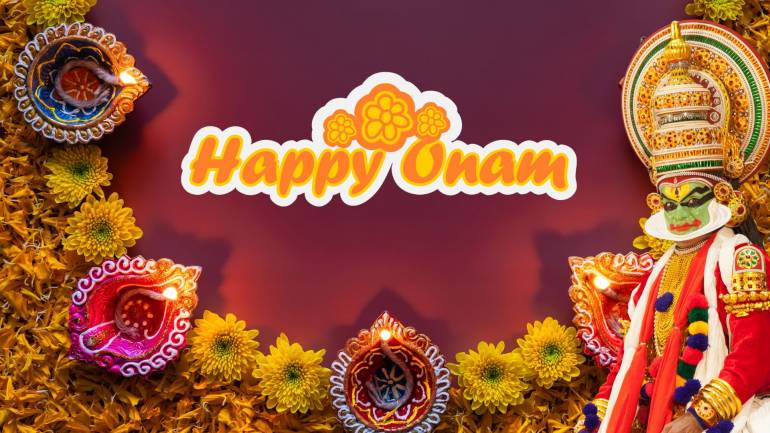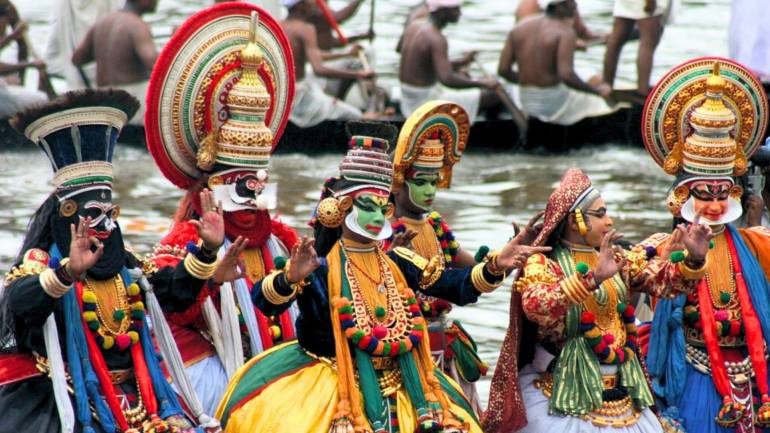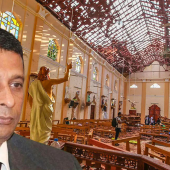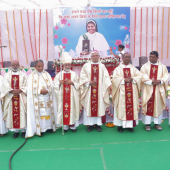Onam: A Living Parable of God’s Kingdom

(Onam is a major Indian cultural festival celebrated by the people of Kerala in the country’s south. In this Art and Culture special article, Sr. K. J. Belji, a Sister of Charity of Nazareth, traces the origin of the festival, its distinctive features, its Christian adaptation, and presents it as a modern, living parable of God’s Kingdom. Amid war, hatred, and doubt, the celebration of Onam represents hope that a just and peaceful world is possible. - Editor)
Onam, celebrated from August 26 to September 5, 2025, is Kerala's most anticipated festival. At its heart lies Thiruvonam day, when families reunite, and neighbours gather to retell the ancient story of Mahabali, the generous king who ruled Kerala in an age of equality.
At the centre of Onam’s legend is Mahabali (Maveli). Folk songs recall his reign as a golden era when “all were equal, none suffered.” According to legend, Mahabali was sent to the underworld by Vāmana, the dwarf-incarnation of Vishnu. However, out of compassion, he was granted permission to visit his people once every year. Onam marks that homecoming.
Historical records trace Onam back over 2,000 years, with Sangam poetry and temple inscriptions at Thrikkakara considered the festival’s cradle. Rooted in the Malayalam month of Chingam, it coincides with the rice harvest, transforming gratitude into ritual and feast.
For ten days, Kerala becomes a festival ground. Each household arranges a pookkalam (floral carpet) at its doorstep, symbolising welcome and joy. The climax comes with the Onam sadya, a sumptuous vegetarian meal served on banana leaves, rice, curries, pickles, papad, and payasam arranged with ritual care. It is more than food; it is a symbol of equality, for all sit side by side and eat the same meal.
Public celebrations swell the joy: Pulikali dancers painted as tigers parade the streets, while vallamkali (snake-boat races) turn rivers into battlegrounds of rhythm and teamwork. For tourists, it’s a dazzling spectacle; for Keralites, it’s a heartbeat of identity, pulsing with colour, rhythm, and pride.
But above all, Onam is inclusive. Hindus, Muslims, and Christians alike celebrate it as a rare festival that transcends religious lines.
Christians and Onam: Between Culture and Faith
For Kerala’s Christians, Syro-Malabar, Syro-Malankara, Latin, Protestant, and Pentecostal Onam arrives each year like a tapestry of colour and fragrance across ‘God’s own country.’ It is not part of Christian liturgy and worship. Yet, in its cultural beauty, it is embraced as a moment to rejoice in God’s gifts of creation, community, and fellowship.
Parishes open their doors for the Onam sadya, turning the banquet table into a place of welcome for the poor, migrant workers, and neighbours of every faith. Schools and colleges host pookkalam (floral carpet) competitions, where children weave circles of flowers, and beauty becomes a lesson in harmony. Families step into Kerala’s white-and-gold garments, the mundu and kasavu saree, and in that simplicity, share festive meals with neighbours, reminding one another that joy multiplies only when it is shared.
The Church, in her wisdom, offers clarity. In 2024, the Syro-Malabar Church reminded the faithful that Onam is a cultural celebration, not a religious observance for Christians. That clarity is freedom: it allows believers to enter joyfully into its human expressions without confusing culture with cult, to celebrate what is good and true while remaining rooted in Christ, the only Lord of time and history.

Reading Onam through the Gospel
The story of Mahabali echoes the Eucharist, where Christians recall Christ's saving work and await the Kingdom where all will be equal. The Onam sadya, a traditional feast, symbolizes table fellowship and hospitality.
The pookkalam (floral carpet), too, carries meaning for the believer. Flowers laid at the threshold are not merely ornaments but acts of hospitality, where colour and fragrance proclaim generosity. For Christians, to adorn the home with beauty is to allow it to become a threshold of love, a place where “hospitality” is lived in obedience to the Gospel (Romans 12:13). Each petal is a reminder that creation itself is liturgy, and that beauty can draw us to God.
Nor should we overlook the joy of Onam, the laughter of games, the rhythm of dance, and the songs that rise in the community. Christianity does not dismiss such joy but embraces it, for festivity belongs to faith. “A Christian is never gloomy,” Pope Francis reminded us, and indeed joy is itself a mission. To celebrate joyfully with neighbours is to bear witness to the Resurrection, proclaiming by our lives that Christ has conquered death and opened eternity.
Towards the Eternal Banquet
For Christians, Onam becomes a cultural space transfigured by faith, directing their gaze to Christ the Eternal King. The festival prefigures the Eucharistic table and the promise of an eternal banquet where all peoples will sit as equals.
It is a parable of God’s Kingdom, a reminder that life can be just, inclusive, and joyful. As we look to the future, Onam offers a vision worth carrying: a society where everyone has a place at the table, where hope returns year after year, and where the banquet of justice is already set before us.
A Prophetic Festival for a Wounded World
Today’s world, scarred by war, hunger, and division, yearns for a just society. Onam whispers a prophetic word: it is possible. At its banquet, people sit together without distinction; at its festivities, communities rejoice without suspicion. It becomes a sign of the heavenly banquet where God “will wipe every tear from their eyes” (Revelation 21:4).
This vision resonates with the Federation of Asian Bishops’ Conferences (FABC), which calls the Church to a “triple dialogue” with cultures, religions, and the poor. Onam embodies all three: it honours culture, fosters interfaith friendship, and recalls a king who ruled with justice for all.
Radio Veritas Asia (RVA), a media platform of the Catholic Church, aims to share Christ. RVA started in 1969 as a continental Catholic radio station to serve Asian countries in their respective local language, thus earning the tag “the Voice of Asian Christianity.” Responding to the emerging context, RVA embraced media platforms to connect with the global Asian audience via its 21 language websites and various social media platforms.













- Reply
Permalink